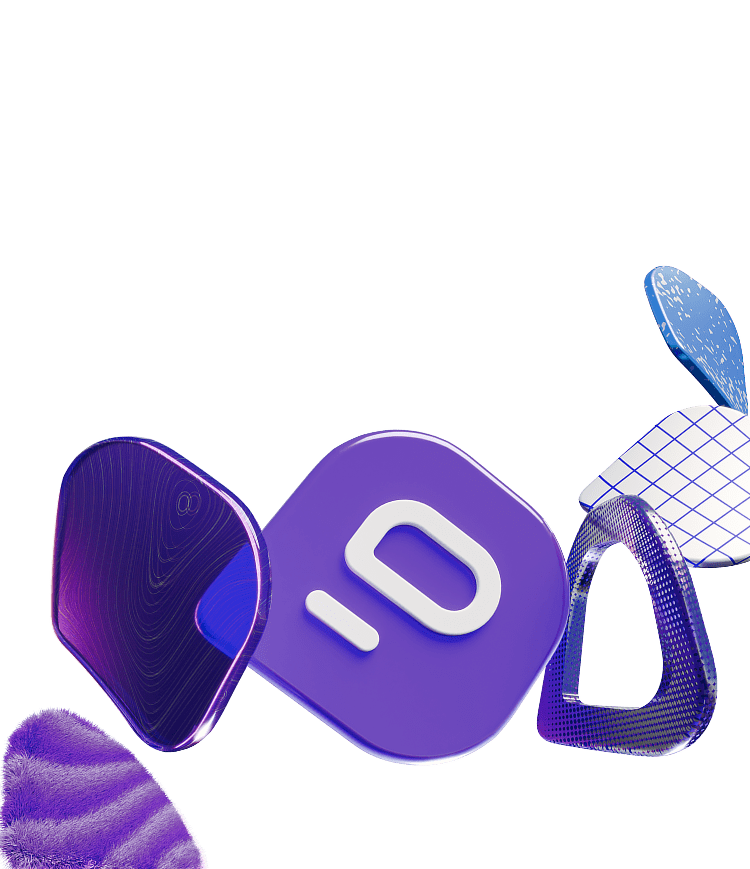Working in human resources can feel like you’re trying to keep a dozen plates spinning at the same time.
After all, the HR team is tasked with managing the entire employee lifecycle — from recruitment and employee onboarding to training and development and beyond.
Keeping all those plates in the air requires some serious investment. But, do you even have time to test different HR communication tools and figure out which employee onboarding software works best for all employees?
Well, the good news is: there’s a team communication app that can help you replace all those tools and maintain control of all stages of the employee lifecycle.
Pumble by CAKE.com is an all-in-one messaging and video conferencing platform that can act as your team’s digital HQ while also helping you integrate new hires into the company culture.
In this guide to Pumble for HR teams, you’ll see what your company’s employee lifecycle can look like if you follow the Pumble playbook.

Stage 1: Recruitment
As the first stage of the employee lifecycle, recruitment is a crucial part of work in human resources.
HR professionals need to be able to:
- Coordinate with hiring managers,
- Share feedback on prospective job candidates, and
- Schedule and conduct job interviews.
But, when you’re hiring people for different departments and teams within your organization, this process can get more than a bit confusing.
C'est là que Pumble intervient.
Collaborating on your next great hire with Pumble for HR teams
With Pumble, conducting multiple hiring processes at the same time will become a breeze.
You can create private channels to make discussions surrounding different role hiring processes confidential. If you keep all information about specific candidates in the threads under your messages (as shown below), you’ll be able to:
- Keep conversations organized around topics (or, in this case, candidates),
- Follow up on previous messages without derailing the other conversations that may be happening in the channel, and
- Declutter channels (though checking that “Also send to the channel” box can also bring your thread message to the attention of other channel members).
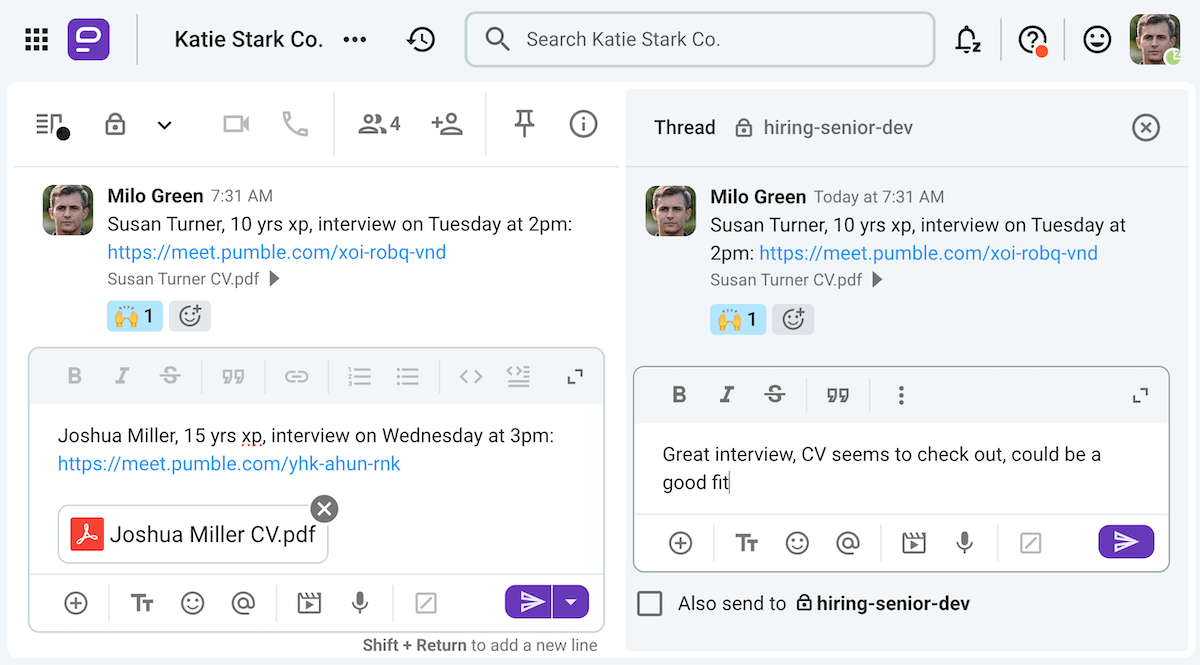
Beyond organizing your channels to keep track of different hiring processes, you can also use Pumble to conduct online interviews. The app even has a Google Calendar integration, allowing you and your prospective job candidates to join meetings right from Google Calendar.
And, if you prefer to give people a trial period or an internship before making a formal job offer, you can still give them partial access to your Pumble workspace with guest access accounts.
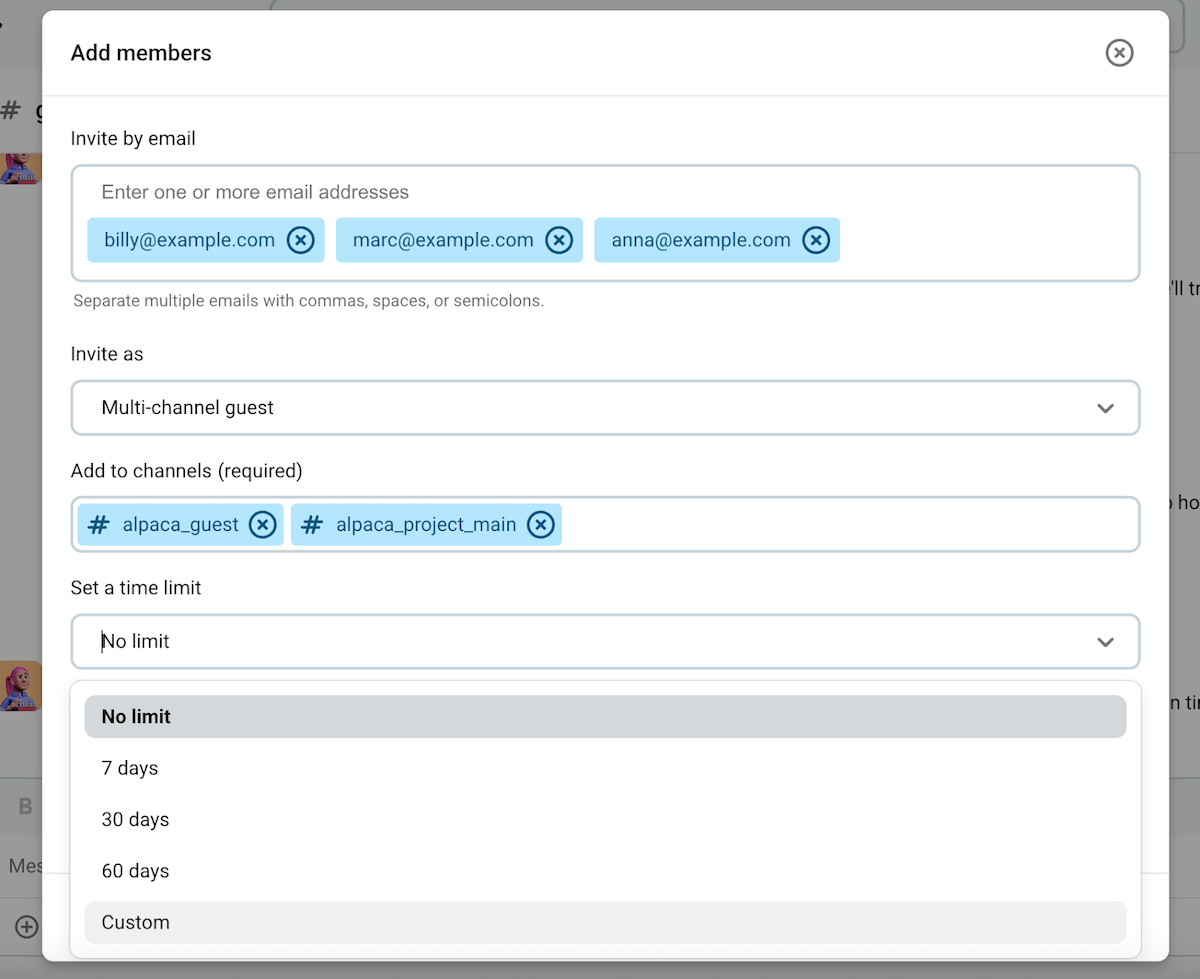
🎓 ASTUCE PRO DE PUMBLE
Interested in learning more about Pumble’s guest access feature? Check out this article:
Stage 2: Onboarding
Once you find the perfect candidates to bring into the fold, you’ll also have to:
- Set expectations for their position and responsibilities,
- Encourage them to make connections on their teams, and
- Familiarize them with the company culture and values.
Without proper processes in place, this stage of the employee lifecycle can be chaotic and overwhelming for new hires and HR professionals alike.
But, unlike new hires, HR teams have the power to make employee onboarding less chaotic by creating processes that increase employee engagement and retention.
Here’s how Pumble can help you do just that.
Creating a world-class welcome experience with Pumble for HR teams
If you want to make sure your new hires have everything they need to hit the ground running on day one, you’ll need to do some setting up in advance.
For one, you could welcome all new hires by creating a group chat with their manager as well as a work buddy, as shown below.
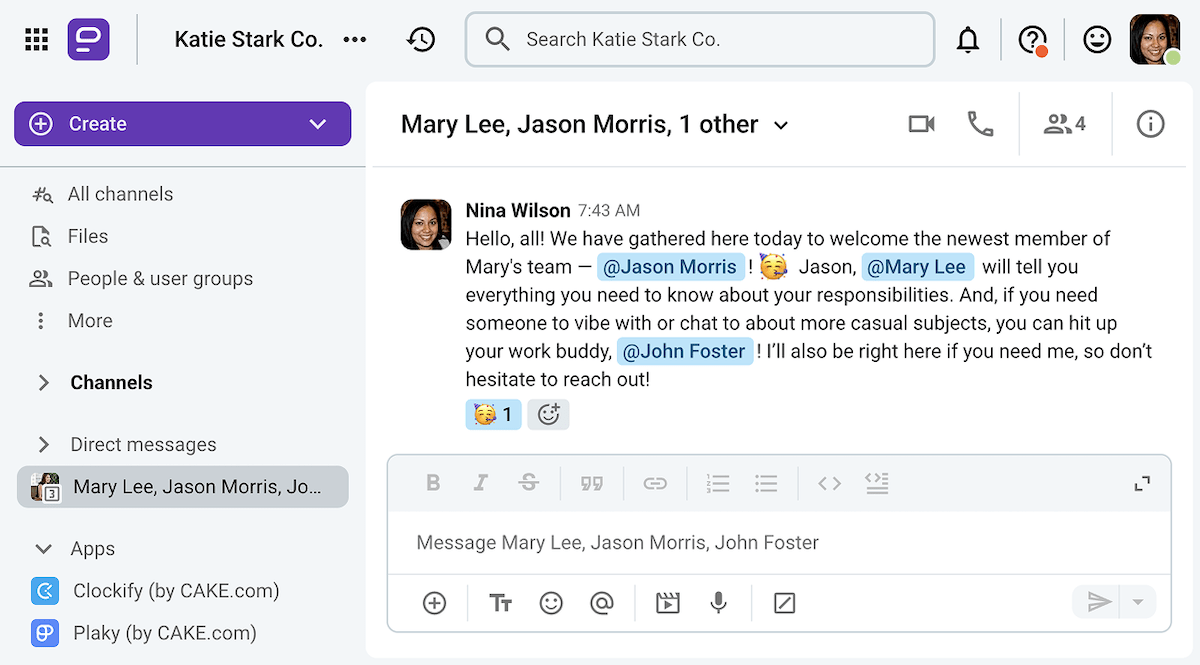
You could also make it so the new users you add to your Pumble workspace are all automatically added to certain channels, such as the:
- #welcome channel for celebrating new additions to the company,
- #announcements channel where employees can keep track of company news, and
- #hr-policies channel where everyone can go to check company policies.
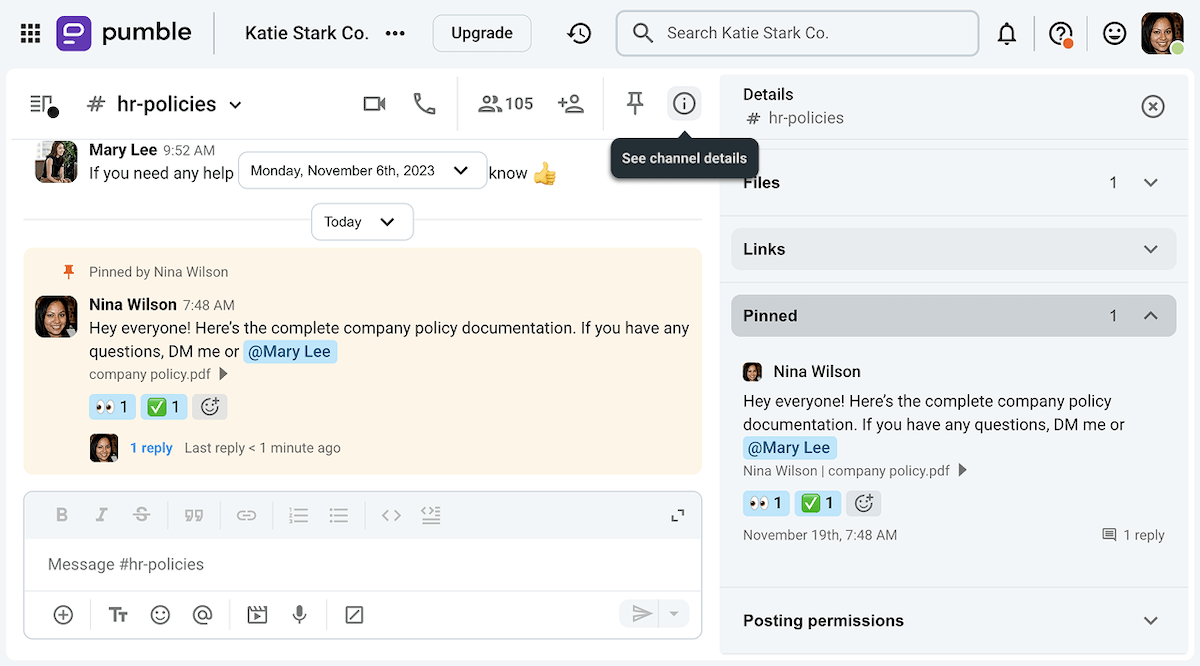
On top of that, managers can manually add their new team members into channels that may not be relevant to all new hires.
With Pumble’s unlimited searchable message history (which is also available to free users), new hires should be able to easily get up to date on everything that’s been going on in the channels they’ve been added to.
🎓 ASTUCE PRO DE PUMBLE
Having new members automatically join certain channels is one of Pumble’s hidden gems. To discover the rest, check out this guide:
Stage 3: Engagement & culture
Beyond finding new talent and helping them gain their footing in their organization, HR professionals are also tasked with maintaining a positive company culture.
One way to create a positive work environment would be to enact policies that prevent workplace bullying and other signs of toxic work culture.
However, you can also increase employee retention by creating an environment where employees feel encouraged to forge personal connections amongst themselves.
So, let’s see how you might do that with Pumble by CAKE.com.
Building a connected workplace with Pumble for HR teams
In addition to offering unlimited message history, Pumble also lets all users create as many channels as they need in their workspaces.
This freedom lets you create channels for discussing all sorts of topics — and not just work-related ones.
When you create your workspace, Pumble will automatically generate the #general and #random channels, which you can use for formal announcements and informal conversations, respectively. However, if you want to bring your employees closer together, you can also create channels like the:
- #kudos channel for providing employee recognition,
- #hobbies channel for discussing passion projects, and even a
- #recommendations channel for sharing movie, show, music, and books recommendations.
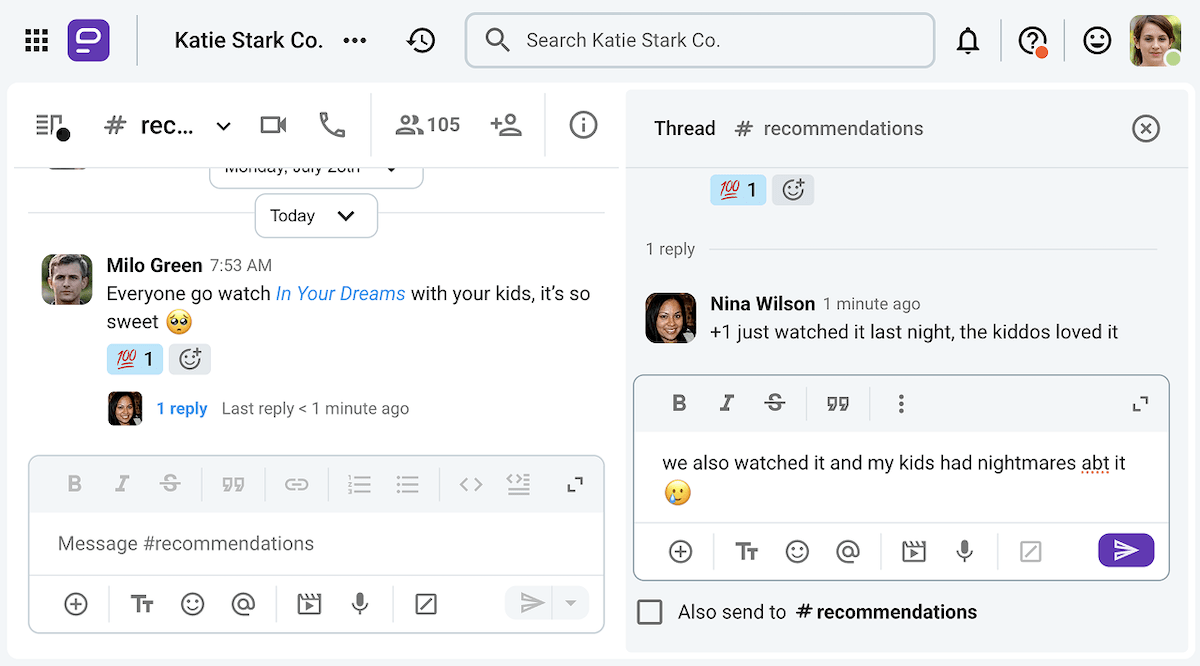
Aside from that, you can also encourage your employees to build connections through other communication channels, like voice and video messages and calls.
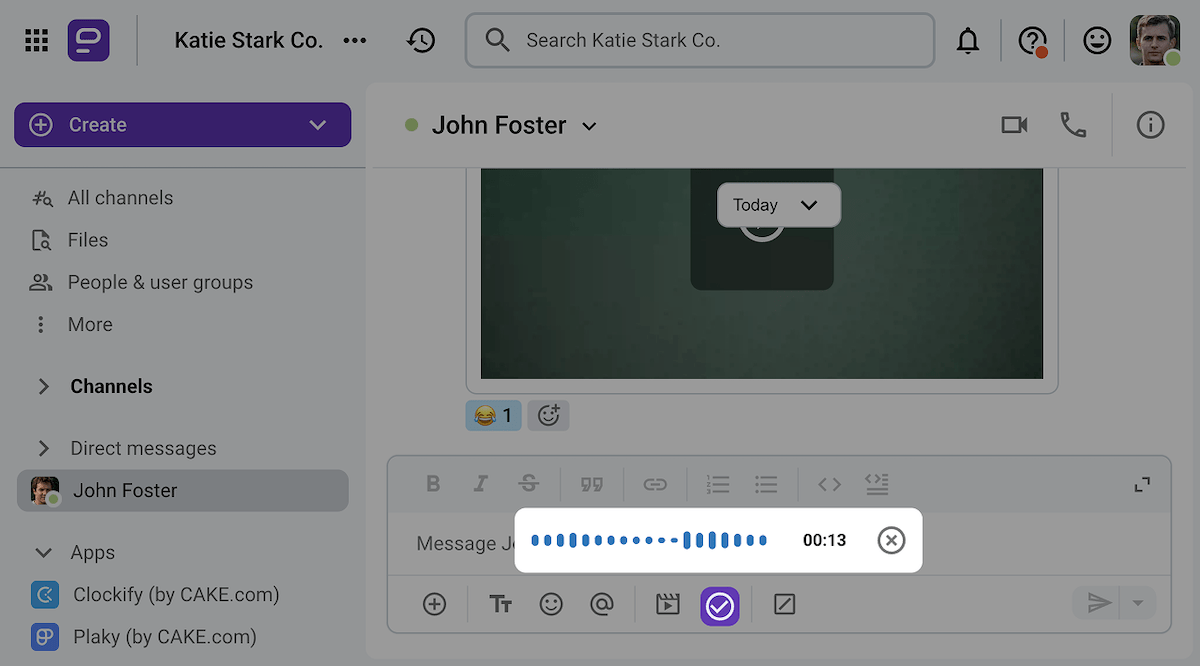
So, if you’re looking to improve the employee experience in your organization, make sure your employees know about these features — especially if they’re remote-first workers.
Stage 4: Training & development
Of course, working in human resources isn’t all fun and games.
Sometimes, it’s about making sure your employees have everything they need to keep developing their professional skills.
But, like most of the other stages of the employee lifecycle, this one often relies on collaboration technology.
With the wrong tools, the materials needed for training and development can get scattered and lost across different platforms.
Then again, if you use Pumble as your digital workspace, your employees will be able to easily find and access all those materials without having to switch too many tabs.
Centralizing your learning resources with Pumble for HR teams
Pumble has many features that can help you promote employee training and development in your organization.
For one, you can use it to set up a dedicated #training-resources channel, where you can:
- Keep all training materials easily accessible in the Files tab of the channel details card (located behind the “i” icon in the top right corner of the channel),
- Make announcements ahead of educational workshops, and
- Pin important messages so people can go back to them when they need to.
Employees should also find Pumble’s message reminder feature useful when they need to follow up on required training or to make sure they don’t forget to respond to an announcement, as shown below.
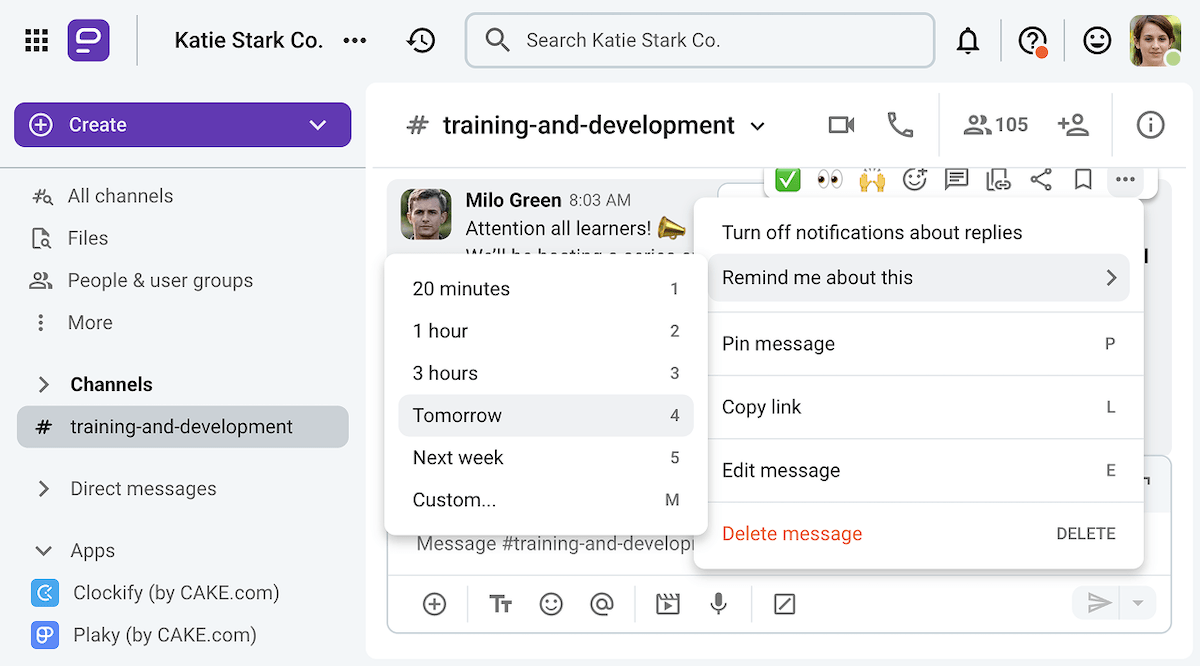
Naturally, Pumble is also the perfect platform for hosting interactive educational workshops, allowing you to:
- Have group meetings with up to 100 people,
- Share your presentation during a meeting,
- Send in-meeting messages,
- Raise your hand to participate in discussions, and
- Use emoji reactions to congratulate your educators on a job well done.
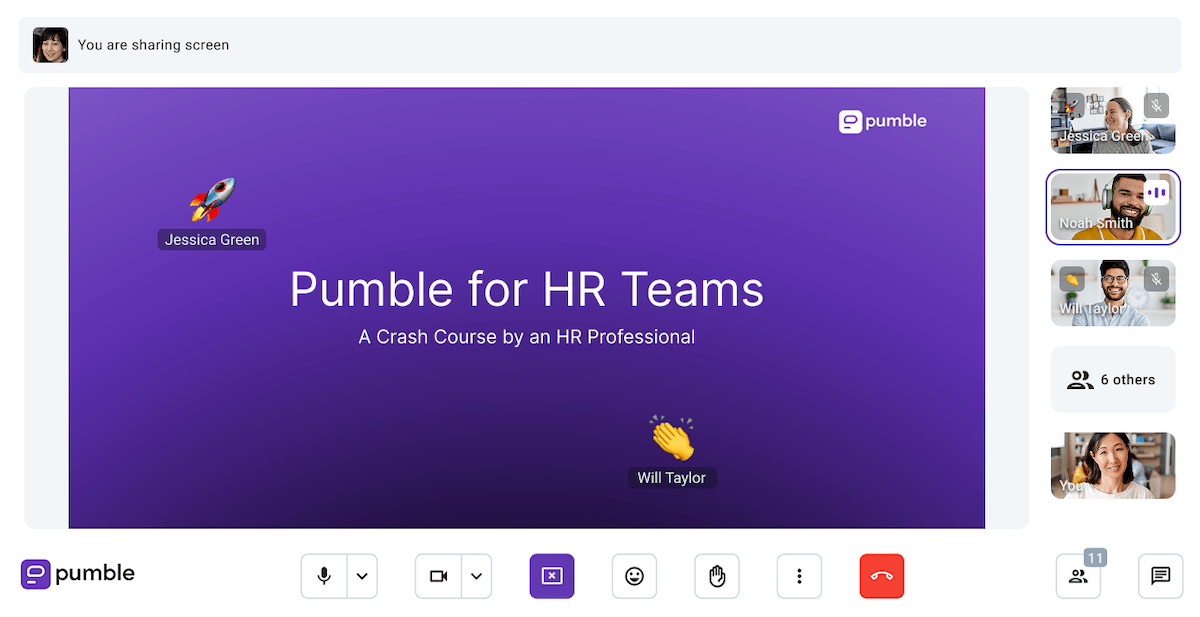
If you see that some employees require more hands-on guidance, you could even establish a mentorship program by creating a #mentorship channel where senior employees can share tips and their mentees’ progress reports.
They can use DMs or group messages to share knowledge with their junior coworkers. And, if your organization works on online documents, they will find Pumble’s Google Drive integration useful.
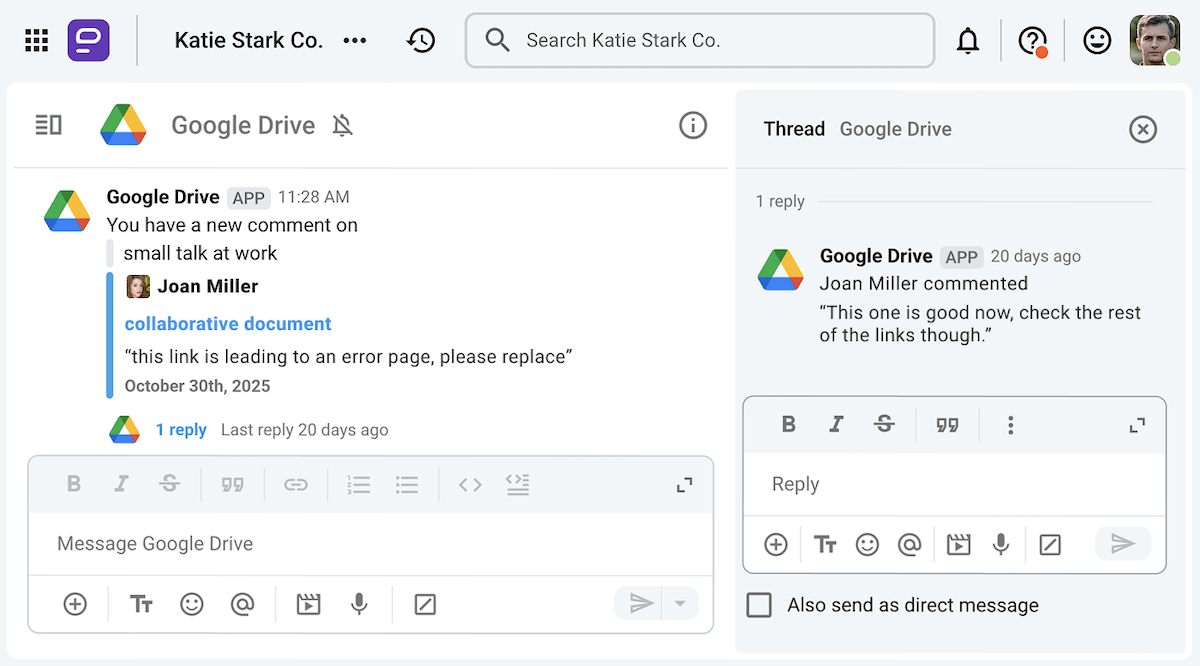
🎓 ASTUCE PRO DE PUMBLE
Pumble is a great tool for knowledge sharing whether you’re a corporate educator or a scholastic one. To learn more about how you can turn Pumble into a proper classroom, check out this resource:
Invest in your team through Pumble
Stage 5: Performance management
As we all know, people require continuous constructive feedback to improve.
Unfortunately, using the wrong communication channels can seriously affect both the frequency and the quality of the feedback employees receive.
Relying solely on infrequent performance reviews can make employees feel more anxious about feedback or, worse still, stop caring about their work altogether, once they realize that only the weeks ahead of performance reviews matter, anyway.
Conversely, if you want to make feedback a part of everyday communication in your organization, you should start by encouraging two-way communication.
Knowing that giving feedback (or feedforward) is a two-way street will make employees more inclined to take their superiors’ feedback to heart.
So, how can you use Pumble to create a feedback culture at work?
Fostering a feedback culture with Pumble for HR teams
The best way to promote a feedback culture in your organization is to create more opportunities for giving and receiving feedback.
In other words, rather than waiting for the annual performance review to give someone their kudos (or even corrective feedback), try:
- Sending them a DM when you want to draw their attention to a mistake they keep making, and
- Using threads to comment on specific works, as shown below.
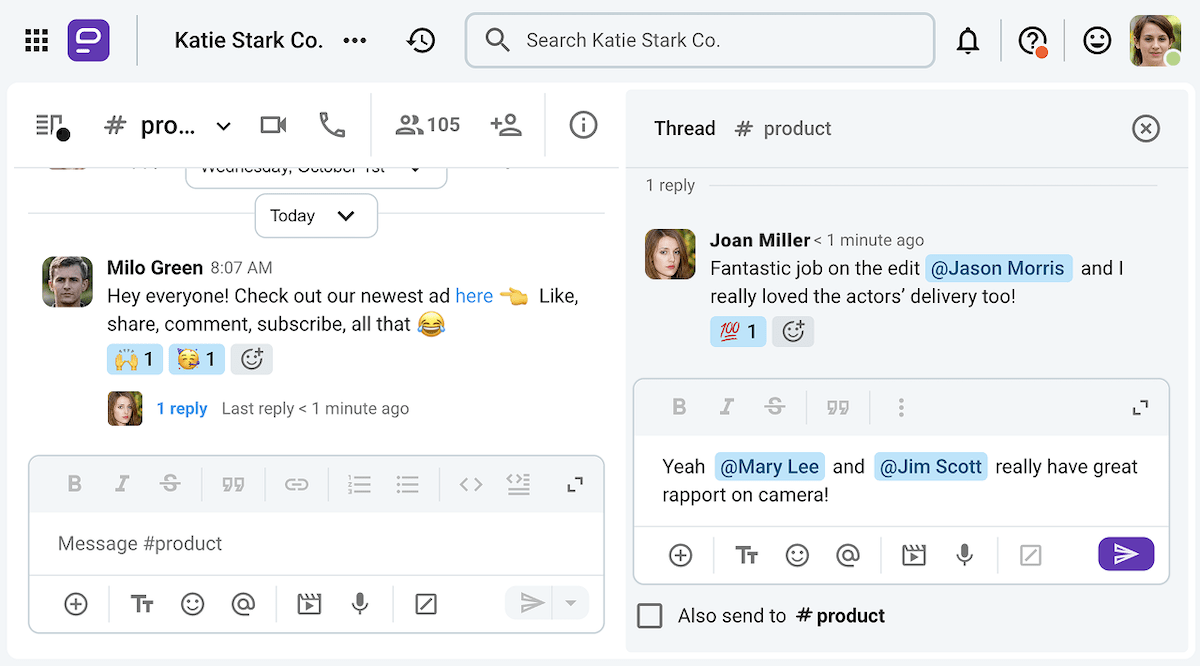
Then again, some kinds of feedback are better delivered face to face via a video call. Luckily, Pumble’s Google Calendar integration lets you schedule recurring one-on-one meetings, letting you regularly check-in with your team members.
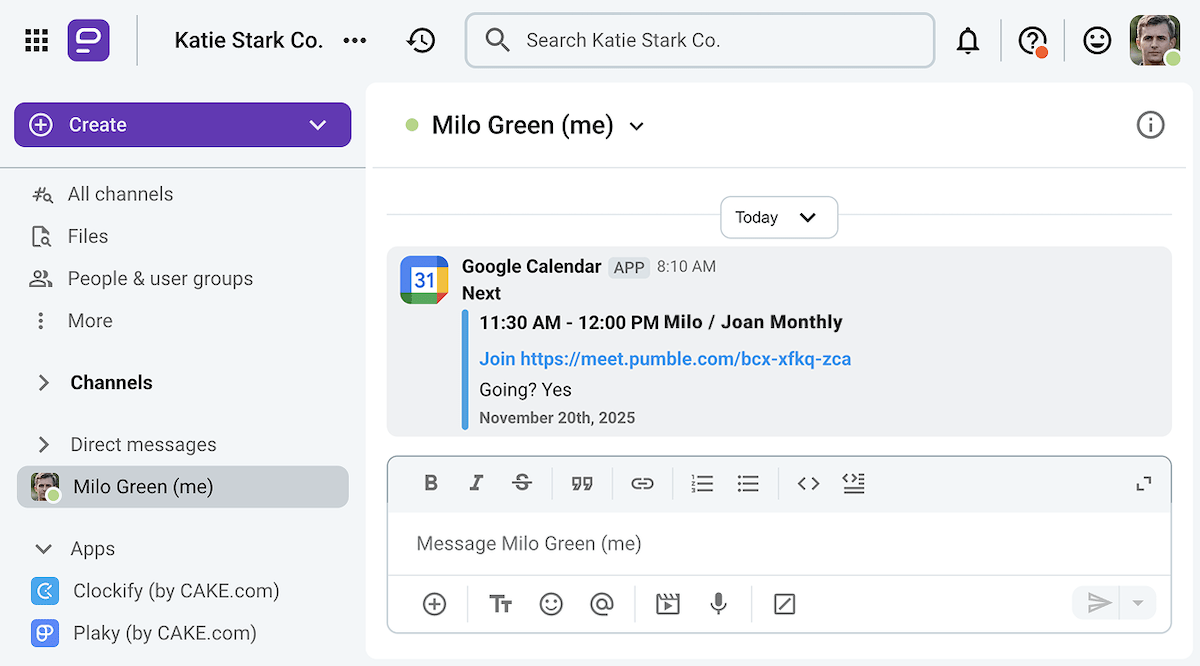
🎓 ASTUCE PRO DE PUMBLE
After a round of performance reviews, HR professionals are often given the dubious privilege of delivering some great (and not so great) news and announcements. If you tend to struggle with those kinds of tasks, here are some resources that might help:
Stage 6: Policy & announcements
Inefficient communication channels can obscure even your best attempts at policy communication, leading to widespread confusion among your employees.
For example, whether you work in an office or have a more hybrid approach, email certainly isn’t the best platform you could use. Important messages can get lost in cluttered inboxes, leaving only some employees aware of any policy changes and announcements you send out.
So, is there a better way to make sure everyone gets the message?
Making Pumble your single source of truth for policy communication
Pumble has several features that should make policy communication somewhat easier.
For one, you can post announcements in a public or private channel and make sure all relevant parties see them by using mentions like:
- @channel, to notify all users in the channel you posted in (even if they have the channel muted),
- @here, to notify all active (or online) channel members, or
- Mentioning a specific user or user group you’ve previously set up.
You can also make it so only certain people can post announcements in official channels by changing the channel posting permissions. If you decide to only grant posting privileges to some higher-ups or members of the HR team, regular employees would be unable to post in the channel, unless you allow posting in the threads of your announcements.
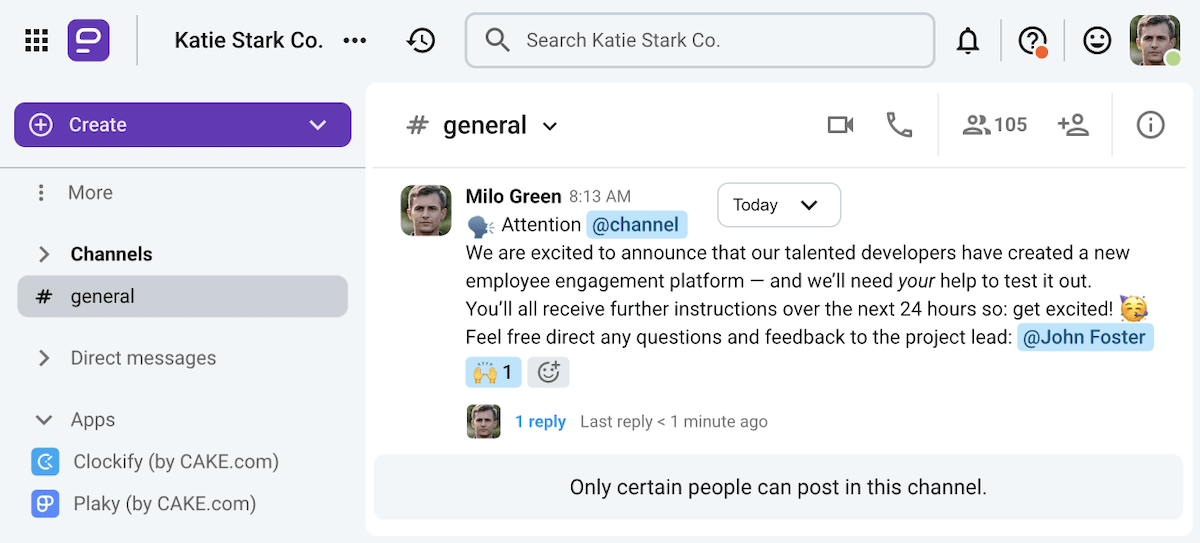
Pumble for HR teams is the perfect tool for managing the employee lifecycle from start to finish
It’s no secret that Pumble is the ultimate communication solution for teams.
But, in addition to providing great value to organizations in more general terms, Pumble can also be adjusted to suit the needs of specific departments within organizations — with HR being one of them.
Simply put, Pumble can help HR teams manage the entirety of the employee lifecycle, replacing multiple HR communication tools.
You can use Pumble’s:
- Customizable channels and threads to organize your team communication,
- Voice and video messages and calls to encourage team collaboration and conduct educational workshops, and
- Useful integrations with Google Calendar, Google Drive, and many others to make your work easier overall.
So, take charge of the employee lifecycle by centralizing your communication.
Testez Pumble de CAKE.com dès aujourd'hui
Comment nous examinons cet article : Nos rédacteurs et éditeurs vérifient les articles et les mettent à jour lorsque de nouvelles informations sont disponibles, afin qu'ils soient toujours d'actualité. Published: novembre 20, 2025
Published: novembre 20, 2025 
